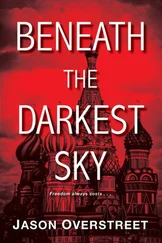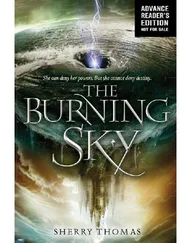“I’ll eat the ham if there is any,” said Tunner. “It’s good stuff, if I remember.”
“Oh, it tastes all right.” She brought out a package of hard-boiled eggs, wrapped with some very oily black olives. The train shrieked and plunged into a tunnel. Kit hastily put the eggs into the basket and looked apprehensively at the window. She could see the outline of her face reflected in the glass, pitilessly illumined by the feeble glare from overhead. The stench of coal smoke increased each second; she could feel it constricting her lungs.
“Phew!” Tunner choked.
She sat still, waiting. If the accident were going to come, it would probably be either in a tunnel or on a trestle. “If I could only be sure it would happen tonight,” she thought. “I could relax. But the uncertainty. You never know, so you always wait.”
Presently they emerged, breathed again. Outside, over the miles of indistinct rocky land, the mountains loomed, jet-black. Above their sharp crests what little light was left in the sky came from between heavy threatening clouds.
“How about those eggs?”
“Oh!” She handed him the whole package.
“I don’t want ’em all!”
“You must eat them,” she said, making a great effort to be present, to take part in the little life going on inside the creaking wooden walls of the car. “I only want some fruit. And a sandwich.”
But she found the bread hard and dry; she had difficulty chewing it. Tunner was busy leaning over, dragging out one of his valises from under the seat. She slipped the uneaten sandwich into the space between her seat and the window.
He sat up, his face triumphant, holding a large dark bottle; he fished in his pocket a moment, and brought out a corkscrew.
“What is it?”
“You guess,” he said grinning.
“Not—champagne!”
“The first time.”
In her nervousness she reached out and clasped his head in her two hands, kissing him noisily on the forehead.
“You darling!” she cried. “You’re marvelous!”
He tugged at the cork; there was a pop. A haggard woman in black passed along the corridor and stared in at them. Holding the bottle in his hand, Tunner rose and drew the shades. Kit watched him, thinking: “He’s very different from Port. Port would never have done this.”
And as he poured it out into the plastic traveling cups, she continued to debate with herself. “But it means nothing except that he spent the money. It’s something bought, that’s all. Still, being willing to spend the money. . . . And having thought of it, more than anything.”
They touched cups in a toast. There was no familiar clink-only a dead paper-like sound. “Here’s to Africa,” said Tunner, suddenly bashful. He had meant to say: “Here’s to tonight.”
“Yes.”
She looked at the bottle where he had set it on the floor. Characteristically, she decided at once that it was the magic object which was going to save her, that through its power she might escape the disaster. She drained her cup. He refilled it.
“We must make it last,” she cautioned, suddenly fearful lest the magic give out.
“You think so? Why?” He pulled out the valise and opened it again. “Look.” There were five more bottles. “That’s why I made such a fuss about carrying this bag myself,” he said, smiling to make his dimples deep. “You probably thought I was nuts.”
“I didn’t notice,” she said faintly, not even noticing the dimples she disliked so strongly. The sight of so much magic had somewhat overcome her.
“So, drink up. Fast and furious.”
“Don’t you worry about me,” she laughed. “I don’t need any exhortations.” She felt absurdly happy much too happy for the occasion, she reminded herself. But it was always a pendulum; in another hour she would be back where she had been a minute ago.
The train came slowly to a stop. Beyond the window it was black night; there was not a light to be seen. Somewhere outside, a voice was singing a strange, repetitious melody. Always beginning high and wandering downward until the breath gave out, only to recommence again at the top of the scale, the song had the pattern of a child’s weeping.
“Is that a man?” said Kit incredulously.
“Where?” said Tunner, looking around.
“Singing.”
He listened a moment. “Hard to tell. Drink up.”
She drank, and smiled. Soon she was staring out the window at the black night. “I think I was never meant to live,” she said ruefully.
He looked worried. “Now see here, Kit. I know you’re nervous. That’s why I brought the fizz-water along. But you’ve just got to calm down. Take it easy. Relax. Nothing’s that important, you know. Who was it said—”
“No. That’s something I don’t want,” she interrupted. “Champagne, yes. Philosophy, no. And I think you were incredibly sweet to have thought of it, especially now that I see why you brought it along.”
He stopped chewing. His face changed expression; his eyes grew a little bit hard. “What do you mean?”
“Because you realized I was a nervous fool on trains. And you couldn’t possibly have done anything I’d have appreciated more.”
He chewed again, and grinned. “Oh, forget it. I’m doing all right by it, too, you may have noticed. So here’s to good old Mumm!” He uncorked the second bottle. Painfully the train started up again.
The fact that they were moving once more exhilarated her. “Dime ingrato, porqui me abandonaste, y sola me dejaste . . .” she sang.
“More?” He held the bottle.
“Claro que si,” she said, downing it at one gulp, and stretching forth her cup again, immediately.
The train jolted along, stopping every little while, each time in what looked like empty countryside. But always there were voices out beyond in the darkness, shouting in the guttural mountain tongue. They completed their supper; as Kit was eating her last fig, Tunner bent over to pull out another bottle from the valise. Without quite knowing what she was doing, she reached into the space where she had hidden her sandwich, drew it out and stuffed it into her handbag on top of her compact. He poured her some champagne.
“The champagne’s not as cool as it was,” she said, sipping it.
“Can’t have everything.”
“Oh, but I love it! I don’t mind it warm. You know, I think I’m getting quite high.”
“Bah! Not on the little bit you’ve had.” He laughed.
“Oh, you don’t know me! When I’m nervous or upset, right off I’m high.”
He looked at his watch. “Well, we’ve got another eight hours at least. We might as well dig in. Is it all right with you if I change seats and sit with you?”
“Of course. I asked you to when we first got on, so you wouldn’t have to ride backwards.”
“Fine.” He rose, stretched, yawned, and sat down beside her very hard, bumping against her. “I’m sorry,” he said. “I miscalculated the beast’s gyrations. God, what a train.” His right arm went around her, and he pulled her toward him a little. “Lean against me. You’ll be more comfortable. Relax! You’re all tense and tight.”
“Tight, yes! I’m afraid so.” She laughed; to her it sounded like a titter. She reclined partially against him, her head on his shoulder. “This should make me feel comfortable,” she was thinking, “but it only makes everything worse. I’m going to jump out of my skin.”
For a few minutes she made herself sit there without moving. It was difficult not to be tense, because it seemed to her that the motion of the train kept pushing her toward him. Slowly she felt the muscles of his arm tightening around her waist. The train came to a halt. She bounded up, crying: “I want to go to the door and see what it looks like outside.”
Читать дальше











